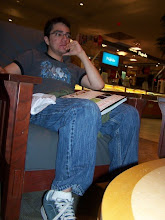
My friend lent me a book she had just finished, called Body of Knowledge by Bryce W. Anderson. She wasn't sure how to take the book, and she wanted my opinion. I started it on Sunday, and finished it on Wednesday. It was a fast read! But sometimes that isn't a good thing...
Anderson tells us a fictional tale of a man (named, oddly enough, Bryce W. Anderson) who forms a friendship with his neighbor who has just moved in across the street. This neighbor, JP is his name, reveals to the narrator that he is an important historical figure who never died. I won't tell you any further details about the plot. I will say that the book gives us this fascinating premise, but not much more.
Slightly over 200 pages long, the book is composed of 46 chapters, meaning that each chapter is little over four pages long. For me, this was a big problem because each chapter is basically an encounter between Anderson and JP, and the encounters seem short and trivial.
Speaking of trivia, the book is full of it. JP bestows many fascinating facts on Anderson, and he grows as a human as a result. Or at least we're told he does. See, the problem is that we're told much more than we're shown. We don't really experience Anderson's growth, we just have to take his word for it. And the fascinating facts aren't nearly as fascinating as they purport to be.
Body of Knowledge is along the lines of the film Tuesdays with Morrie (and I'm assuming the book, though I haven't read it) or Bill Moyers interviews with Joseph Campbell in the television series The Power of Myth and subsequent book, but it doesn't have the power of either of those works. JP's character traits aren't strong enough to make him lovable like Jack Lemmon's portrayal of Morrie. Added to that, JP's so-called wisdom isn't as profound as it aims to be.
The book is composed of mini-conversations, which Anderson likens to threads. These tiny segments of knowledge could have made up for the lack of characters and descriptions, but they weren't strong enough. When Bill Moyers interviewed expert in mythology Joseph Campbell a few decades ago, Campbell talked about everything from human desire to life to death to heroism. That series is so fascinating because Campbell had so much wisdom and knowledge to share. JP, who has had 2000 years to accumulate knowledge, seems to have nothing but menial trivia, the same sort of trivia I've picked up in high school and college.
So at the end of the book I wasn't moved over the loss of JP the way I was when Morrie dies at the end of the film, or by the fact that Campbell passed away after his interviews, because JP's character wasn't particularly original and somewhat two-dimensional, and his wisdom wasn't very deep. Even if Bryce had experienced some sort of conflict in his life, and JP helped him (or failed to help him) that would have added something to the book. But nothing happens, and so the book is not very extraordinary.
I recommend watching The Power of Myth, or even buying the book, which is essentially a transcript of the conversations. The information contained in that work is amazing, and Campbell was a brilliant man.

No comments:
Post a Comment